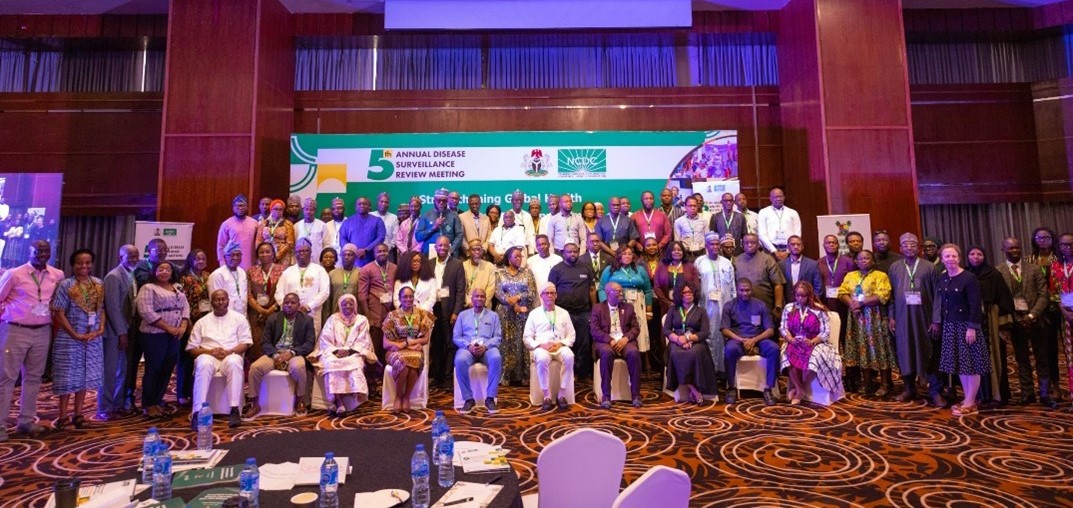
Nigeria’s 5th Annual Disease Surveillance Review Meeting (ADSRM) took place from the 28 – 30 of October 2024 with the theme “Strengthening Global Health Security Through the Improvement of Disease Surveillance”. The UK Health Security Agency (UKHSA) International Health Regulations Strengthening Project (IHR-SP) contributed to discussions on strengthening Nigeria’s surveillance system at the invitation of Nigeria Centre for Disease Control and Prevention (NCDC).

Attendees of Nigeria’s 5th Annual Disease Surveillance Review Meeting
The ADSRM aims to bring together public health surveillance stakeholders from around the country to discuss and share ideas about how best to strengthen Nigeria’s surveillance systems’ ability to detect, prevent and respond to diseases of public health importance. As an introduction into the discussions, the NCDC Director of Surveillance and Epidemiology, Dr Fatimah Saleh, reiterated the importance of compliance with the IHR (2005) for Global Health Security, acknowledging Nigeria’s slow but consistent improvement in the Joint External Evaluation (JEE) scores from 2017 (39%) to 2023 (54%), while also acknowledging the gaps in Nigeria’s surveillance capacities identified by the 2023 JEE.
Impact on Global Health Security
Nigeria conducted a country-led JEE in November 2019, where the IHR-SP served as a Mission Lead, responsible for feeding back immediate recommendations from the evaluation to the country leads/stakeholders. The country-led JEE emphasised the need to strengthen capacities at sub-national level and with support from IHR-SP and other development partners, Nigeria developed a bespoke Health Security Assessment Tool for the sub-national level. The tool was piloted in three States (Enugu, Kano and Kebbi) and IHR-SP participated in the very first assessment in Enugu State, as well as in Kano State.
Kano State presented on their experience of, and progress since their Health Security Assessment in 2021. Their resultant Health Security Assessment has successfully contributed to the state legislature passing the Kano State Health Security Law, inclusion of a budget line for Emergency Preparedness and Response, and the development of Kano State Action Plan for Health Security. Nigeria has so far conducted Health Security Assessments in 10 of the 36 States and the Federal Capital Territory (FCT) and it intends to continue with these assessments using the tool in the future.
Improving Nigeria’s surveillance system

Dr Olusola Aruna, IHR-SP Country Lead for Nigeria (pictured right, far right of image), moderated the first panel discussion which focused on a SWOT analysis of Nigeria’s surveillance capacity. By the end of the discussions, the importance of inter- and multi- sectoral coordination and collaboration and appropriate funding as a means of strengthening weaknesses and addressing threats could not be over emphasised.
UKHSA IHR-SP’s Technical Advisor on Surveillance, Dr Jerry Pantuvo, also presented the findings of a Learning Needs Assessment of the State Epidemiologists and State Disease Surveillance and Notification Officers (DSNOs) and participated in a panel discussion thereafter. Dr Pantuvo drew attention to the critical gaps in field epidemiology competence among critical surveillance workforce at the subnational level, despite their academic qualifications and years of experience. As a panellist in the discussion on “How to improve disease surveillance at the sub-national level”, Dr Pantuvo highlighted the importance of a mentorship programme that leverages on existing capacities and fosters peer to peer learning. Such a mentorship programme could close immediate competency gaps in data analysis including the capacity to interpret epidemiological data to improve public health programme priorities. Other areas requiring immediate attention included building capacity for evaluating the surveillance system, strategic planning and generating the evidence for securing the required funding from governments and partners to build a resilient surveillance system.
Environmental Health Surveillance
The Federal Ministry of Environment presented on progress made in implementing the Integrated National Environmental Health Surveillance System (INEHSS). This is a hazard surveillance system which serves to act as an early warning system to improve Nigeria’s preparedness and response mechanisms. UKHSA’s IHR-SP is supporting this initiative and has previously delivered a workshop that brought 25 relevant stakeholders to review the existing INEHSS guidelines. When completed, the updated INHESS guidelines will support the operationalisation of a hazard surveillance system. It will define the reportable environmental incidents, describe roles and responsibilities of each level of the surveillance system. The system will outline operations to provide relevant and timely information on potential hazards to humans and animals and the environment for prompt public health interventions.
After three days of focused discussions on how to improve disease surveillance in Nigeria and strengthen Global Health Security, a key take away was the importance of a collaborative and integragted approach to addressing identified gaps.